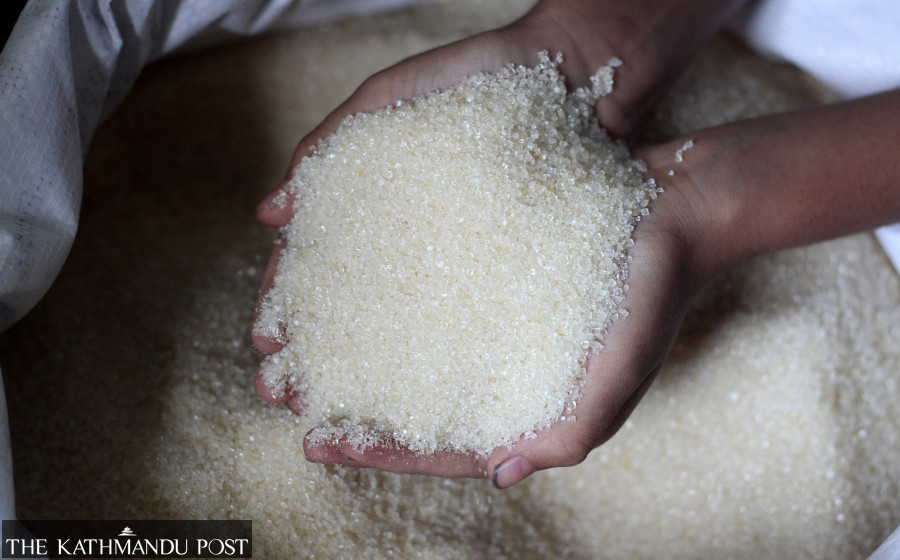Money
Nepal to import 20K tonnes of sugar to prevent price hikes
The retail price of the popular sweetener has jumped from Rs110 to Rs130 per kg in less than two weeks, say traders.
Krishana Prasain
Mahendra Neupane had invited his sisters for a Teej party at his home on Thursday, and so he went to the grocery to buy sugar to make the Nepali doughnut that is the special dish of the festival.
When the grocer told him the price of the popular sweetener, Neupane had to open his mouth wide in amazement.
“I was stunned when the shopkeeper said Rs130 per kg. Just one-two weeks ago, I had bought sugar for Rs105 per kg,” said Neupane who lives in Tikathali. But there was little he could do and paid Rs260 for 2 kg.
“The price rose by Rs25 per kg in just two weeks. The way prices of food items are increasing, it’s unbelievable and frustrating,” he said.
Raju Maskey, secretary of the Nepal Retailers Trade Association, pointed to the wholesalers for the price rise.
“The wholesalers hiked the price of sugar saying that prices had increased in India. There is adequate inventory in the market, and we do not know why the price has gone up so sharply,” he said.
Nepal imports much of its food from India.
“We were selling sugar at Rs105 to Rs110 per kg just 10-12 days ago, and now many retailers are saying they are selling it for Rs120 to Rs130 per kg,” said Maskey.
Neupane, a retired government employee, said he had never seen prices jump like that, especially in food items.
In India, sugar prices rose by more than 3 percent in a fortnight to a six-year high, Reuters quoted traders and industry officials as saying. They said low rainfall in the country's key growing regions had raised production concerns for the upcoming season.
Sugar output in Maharashtra, India's top producing state, is likely to fall 14 percent in the 2023-24 crop year to its lowest in four years due to lower cane yields following the driest August in more than a century.
Maharashtra's output is crucial to India's ability to export, making the outlook for overseas shipments dismal for the coming season. New Delhi is expected to ban mills from exporting sugar in the season beginning in October, halting shipments for the first time in seven years.
Madhav Timalsina, president of the Consumer Rights Investigation Forum, blamed the jump in prices in Nepal to unscrupulous trade practices.
“This is cartelling by the domestic sugar industry. Sugar is available at a high price but not at Rs89 per kg which was the price a month ago," Timalsina said.
“The lack of responsibility of the Supply Ministry to the public, and its incompetence in easing supply has emboldened sugar traders to raise prices at will,” he said.
"The traders have been influencing and pressuring the government which has increased the price of essential food items in the market."
On Wednesday, the Finance Ministry approved the import of 20,000 tonnes of sugar. The Ministry of Industry, Commerce and Supplies had proposed to import 60,000 tonnes of sugar to meet the anticipated festival demand.
Two state-owned companies, Salt Trading Corporation and Food Management and Trading Company, will each be importing 10,000 tonnes of sugar.
The government has slashed the import duty by half to provide relief to consumers. The usual import duty on sugar is 30 percent and there is another 13 percent VAT.
“We have not received an official letter from the Industry Ministry regarding the import of sugar,” said Kumar Rajbhandari, information officer of Salt Trading Corporation.
“Once we receive the letter from the ministry, we will call for tenders. How long the import will take will depend on the ministry's instructions regarding the process,” Rajbhandari said.
"It will take two months for the shipment to reach Nepal under the normal way. If the ministry says the shipment is required immediately, the company will fast-track the process," he said.
Salt Trading Corporation has not imported sugar in the last two fiscal years. “We wrote to the Industry Ministry to import sugar, but the Finance Ministry did not approve it,” said Rajbhandari.
Timalsina said the government should have started the process to import sugar three months ago so that it would have arrived by now and prices would not have shot up this high.
"As Dashain and Tihar are nearing, traders might increase the price further due to lack of effective market inspection and the shipment arriving late," he said.
Nepal's sugarcane production has been in continuous decline since 2017-18.
According to the Ministry of Agriculture and Livestock Development, Nepali farmers grew 3.67 million tonnes of sugarcane on 78,609 hectares in 2017-18. Output dropped sharply to 3.18 million tonnes and the acreage shrank to 64,354 hectares in 2020-21.
The ministry says production has been falling due to high costs and increasing market risk.
Sugarcane farmers say that difficulties in getting payment from the mills and chemical fertiliser from the government have discouraged them from planting the cash crop.
According to Rajbhandari, Nepal’s annual sugar requirement is around 270,000 tonnes. The country faces a deficit of about 100,000 tonnes of the sweetener annually which is fulfilled through imports by the private sector and sometimes by the two government companies.
Nepal used to produce 155,000 tonnes of sugar annually till a few years ago which has declined to 120,000 tonnes currently, according to the corporation.




 15.12°C Kathmandu
15.12°C Kathmandu














